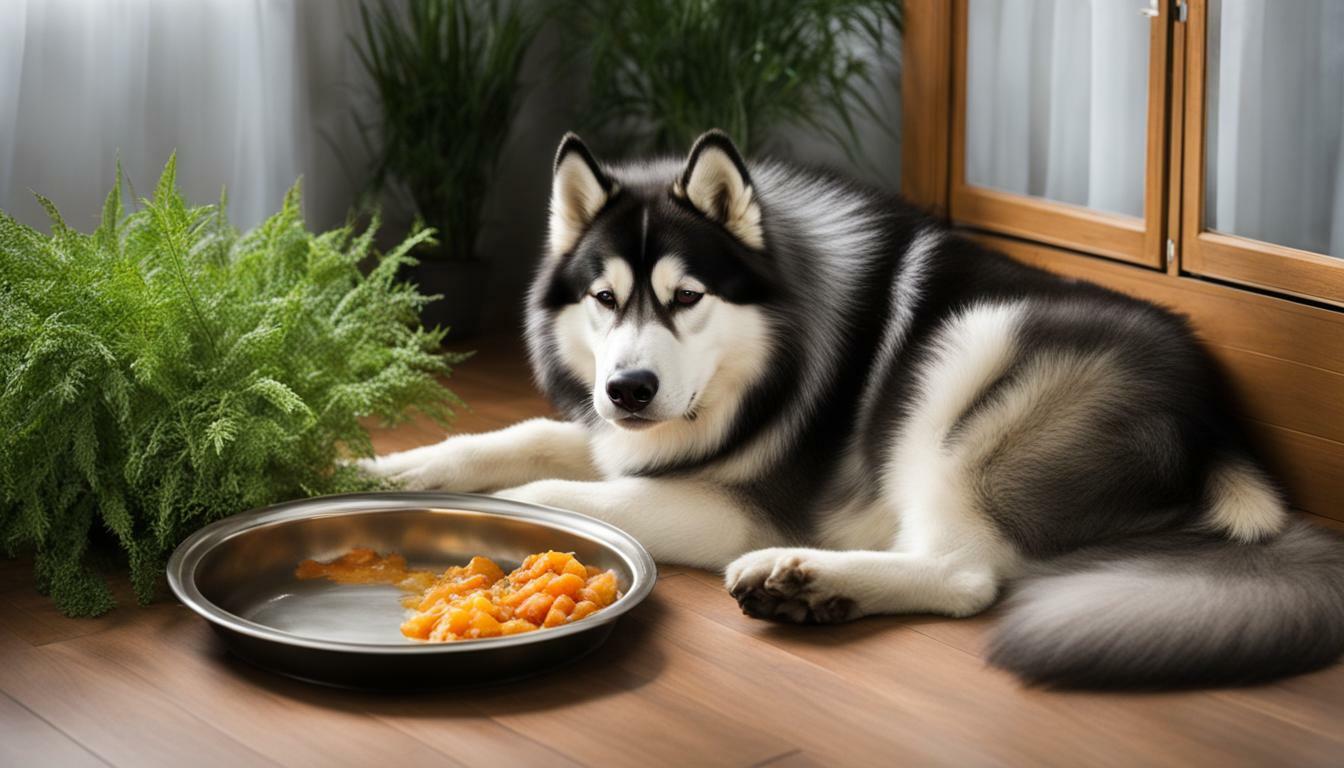If your Malamute is showing a lack of interest in food, there are a few steps you can take to address this concern.
Some Malamutes can be picky eaters and may get tired of the same food every day. In this case, adding a food topper can enhance the flavor and nutrition of their regular food. Freeze-dried meat toppers are a popular option as they are convenient and safe. It is important to ensure that the toppers are healthy and provide the necessary nutrients.
There can be various reasons why a Malamute stops eating. These include stubbornness, lack of exercise, lack of nutrients in the food, anxiety, boredom with the same food, toothache, stomach ache, recent vaccination, or other health issues. It is recommended to try different strategies to encourage your Malamute to eat, such as changing the food, offering treats, ensuring they are active enough, and seeking veterinary attention if necessary.
If your Malamute is not eating due to illness, such as a virus, it is important to contact a veterinarian within 8-12 hours if they are vomiting, having diarrhea, or showing other symptoms of illness. Medications can also affect a dog’s appetite, and certain life changes or owner absence can cause anxiety and impact their hunger. Additionally, dogs may have specific preferences for the time of day they prefer to eat and may refuse food if their regular food has changed or gone stale.
In summary, if your Malamute is not eating, it is important to consider various factors and try different strategies to encourage their appetite. Contacting a veterinarian may be necessary if there are concerning symptoms or a significant change in eating habits.
Reasons Why Malamutes Might Stop Eating
Several factors can contribute to a Malamute’s loss of appetite, which may result in them not eating their regular meals. One common reason is that Malamutes can be picky eaters, getting tired of the same food every day. To address this, you can enhance the flavor and nutrition of their regular food by adding a food topper. A popular option is freeze-dried meat toppers, which are convenient and safe. However, it’s important to ensure that the toppers are healthy and provide the necessary nutrients for your Malamute’s well-being.
Aside from picky eating, there are various other reasons why a Malamute might stop eating. These include lack of exercise, lack of nutrients in their food, anxiety, boredom with the same food, toothache, stomach ache, recent vaccination, or other health issues. It’s important to try different strategies to encourage your Malamute to eat, such as changing the food, offering treats, ensuring they are active enough, and seeking veterinary attention if necessary.
Illness can also be a cause for a dog’s loss of appetite. If your Malamute is vomiting, having diarrhea, or showing other symptoms of illness, it’s crucial to contact a veterinarian within 8-12 hours. Additionally, certain medications can affect a dog’s appetite, and life changes or owner absence can cause anxiety and impact their hunger. Dogs may also have specific preferences for the time of day they prefer to eat and may refuse food if their regular food has changed or gone stale.
In summary, if your Malamute is not eating, it’s important to consider various factors and try different strategies to encourage their appetite. Contacting a veterinarian may be necessary if there are concerning symptoms or a significant change in eating habits. Remember to prioritize your Malamute’s well-being and provide them with a balanced diet and a healthy eating environment.
| Reasons | Actions |
|---|---|
| Picky eater | Add food toppers |
| Lack of exercise | Ensure they are active enough |
| Lack of nutrients in food | Consider changing the food |
| Anxiety | Provide a calm eating environment |
| Boredom with the same food | Switch up their meals |
| Toothache | Seek veterinary attention |
| Stomach ache | Monitor for other symptoms and contact a vet if necessary |
| Recent vaccination | Contact a vet if loss of appetite persists |
| Other health issues | Seek veterinary attention if there are concerning symptoms |
Quote:
“A healthy diet is vital for a Malamute’s well-being and can help address any appetite issues. Adding food toppers or changing their meals can provide a much-needed boost in flavor and nutrition.” – Dr. Amanda Johnson, Veterinary Nutritionist
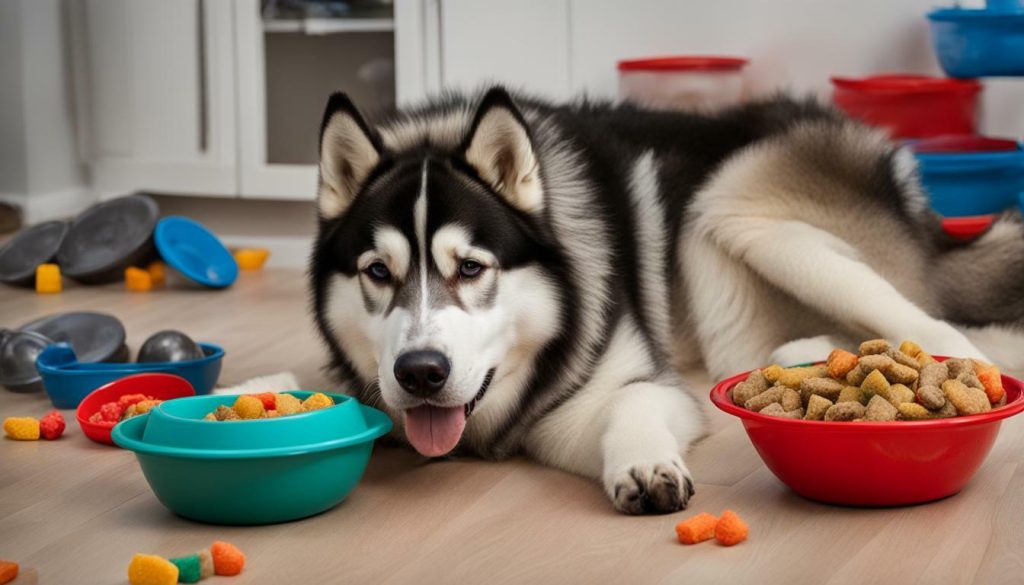 If your Malamute is being a picky eater, there are ways to make their meals more enticing and appealing to them. One option is to add a food topper to their regular food. Freeze-dried meat toppers, for example, are a convenient and safe choice. They can enhance the flavor and provide additional nutrition to your Malamute’s meals. It’s important to choose healthy toppers that contain the necessary nutrients for your dog’s well-being.
If your Malamute is being a picky eater, there are ways to make their meals more enticing and appealing to them. One option is to add a food topper to their regular food. Freeze-dried meat toppers, for example, are a convenient and safe choice. They can enhance the flavor and provide additional nutrition to your Malamute’s meals. It’s important to choose healthy toppers that contain the necessary nutrients for your dog’s well-being.
There can be various reasons why a Malamute may refuse to eat. It could be due to stubbornness, lack of exercise, or boredom with the same food. Anxiety, toothache, stomach ache, recent vaccination, or other health issues may also affect their appetite. To address picky eating behavior, consider changing the type of food you offer or introducing treats as a reward. Make sure your Malamute gets enough exercise to stimulate their appetite. If the problem persists, it’s advisable to consult a veterinarian for further guidance.
If your Malamute is showing symptoms such as vomiting, diarrhea, or a significant change in eating habits, it’s crucial to contact a veterinarian within 8-12 hours. Illnesses, such as viruses, can affect their appetite. Medications can also impact their hunger. Additionally, life changes or owner absence can lead to anxiety, which can further decrease their appetite. Pay attention to your Malamute’s mealtime preferences and avoid sudden and drastic changes in their food.
To summarize, if your Malamute is being a picky eater, there are strategies you can try to encourage their appetite. Adding food toppers, changing the type of food, offering treats, ensuring regular exercise, and seeking veterinary attention if needed are all important considerations. Remember that each dog is unique, and it may take some trial and error to find the best approach for your furry friend.
One effective way to make your Malamute’s meals more appealing is by using food toppers that can add both flavor and nutritional value. Many Malamutes can be picky eaters and may become uninterested in their regular food over time. Adding food toppers can help entice them to eat and ensure they are receiving the necessary nutrients.
Freeze-dried meat toppers are a popular option for enhancing a Malamute’s mealtime. These toppers are convenient and safe, as they can be easily sprinkled over the regular food. They come in a variety of flavors, such as chicken, beef, and salmon, which can help add variety to your Malamute’s diet. Additionally, freeze-dried meat toppers are often rich in protein and other essential nutrients, providing additional health benefits.
When choosing a food topper for your Malamute, it is important to ensure that it is healthy and made from high-quality ingredients. Look for products that are free from artificial additives, preservatives, and fillers. Reading the ingredients list and researching the brand can help you make an informed decision. Consult with your veterinarian if you have any concerns about which food topper is best for your Malamute’s specific needs.
By incorporating food toppers into your Malamute’s mealtime routine, you can enhance their enjoyment of their food and provide them with the essential nutrients they need. Remember to introduce new toppers gradually, monitoring your Malamute’s reaction and adjusting accordingly. With the right food toppers, you can help ensure that your Malamute maintains a healthy and balanced diet.
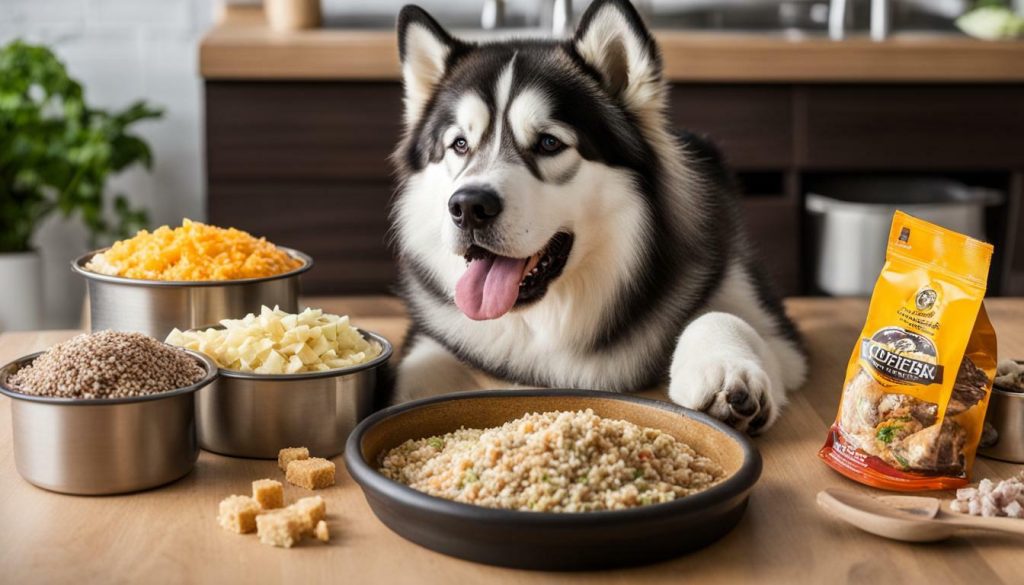
| Benefits of Using Food Toppers | Key Considerations |
|---|---|
| Enhances flavor and palatability of regular food | Choose healthy and high-quality options |
| Provides additional nutrients and health benefits | Introduce new toppers gradually |
| Adds variety to your Malamute’s diet | Monitor your Malamute’s reaction to new toppers |
Factors Affecting a Malamute’s Appetite
Lack of exercise and a monotonous diet can contribute to a decrease in your Malamute’s interest in food. If your furry friend is not getting enough physical activity, they may have less appetite for their meals. Malamutes are active and energetic dogs that require regular exercise to keep them happy and healthy. Make sure to provide them with enough opportunities to burn off energy through walks, playtime, or other physical activities.
Boredom with the same food can also be a factor in your Malamute’s decreased appetite. Just like humans, dogs can get tired of eating the same thing every day. Consider introducing some variety into their diet by rotating different flavors or brands of dog food. Another option is to add food toppers, such as freeze-dried meat, to enhance the taste and nutritional value of their meals. These food toppers are a convenient and safe way to entice your Malamute to eat.
When it comes to your Malamute’s nutrition, it’s important to ensure that their food provides all the necessary nutrients. A balanced and complete dog food should meet their dietary needs. However, if you suspect that your Malamute is not getting enough nutrition from their food, it’s best to consult with a veterinarian. They can recommend specific dietary supplements or make changes to their diet to ensure they’re receiving the proper nutrition.
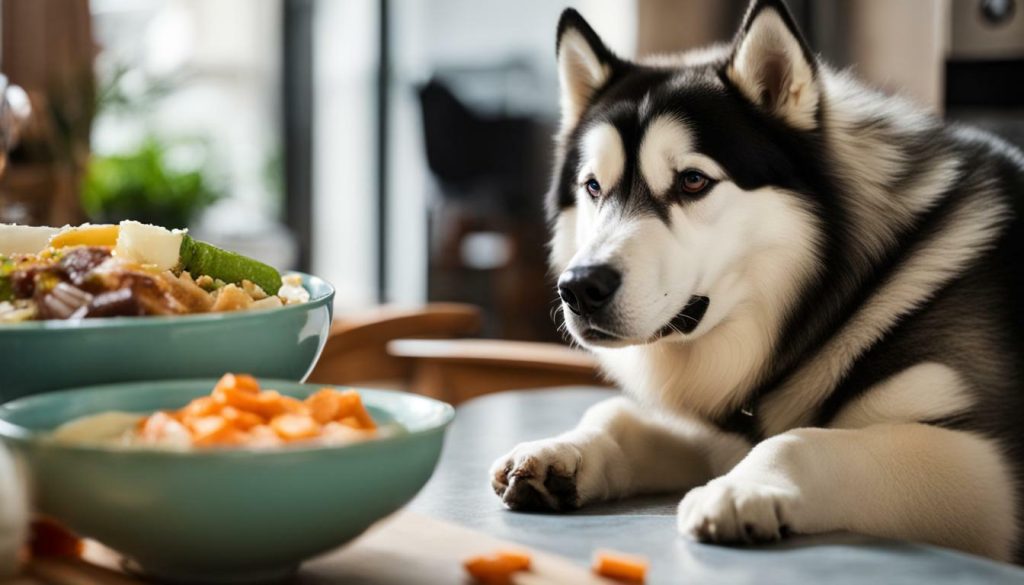
Remember, every dog is unique, and there may be other factors affecting your Malamute’s appetite. It’s essential to observe their behavior and consult with a veterinarian if you notice significant changes in their eating habits or if you have any concerns about their health. By addressing these factors, you can help ensure that your Malamute stays happy, healthy, and well-fed.
Dental Health and Its Impact on Eating
Dental pain can significantly affect a Malamute’s ability and desire to eat their meals. Just like humans, dogs can experience dental issues that cause discomfort and make it challenging for them to chew their food properly. If your Malamute is not eating and you suspect dental problems, it is crucial to address this issue promptly.
Common dental issues in dogs, such as tooth decay, gum disease, or a toothache, can cause pain and discomfort while eating. This can result in a loss of appetite or even a complete refusal to eat. Ignoring dental problems can lead to more serious health issues for your Malamute, so it’s essential to take action.
If you suspect that your Malamute is experiencing dental pain, it is recommended to schedule a visit with your veterinarian. They will be able to assess the dog’s oral health and provide necessary treatment, such as a dental cleaning or tooth extraction if required. Regular dental care, including brushing your dog’s teeth and providing dental chews or toys, can also help prevent dental issues and keep their teeth and gums healthy.
Remember, a healthy mouth is crucial for your Malamute’s overall well-being and their ability to enjoy their meals. By addressing any dental problems promptly and providing the necessary care, you can ensure that your Malamute can eat comfortably and maintain good oral health.
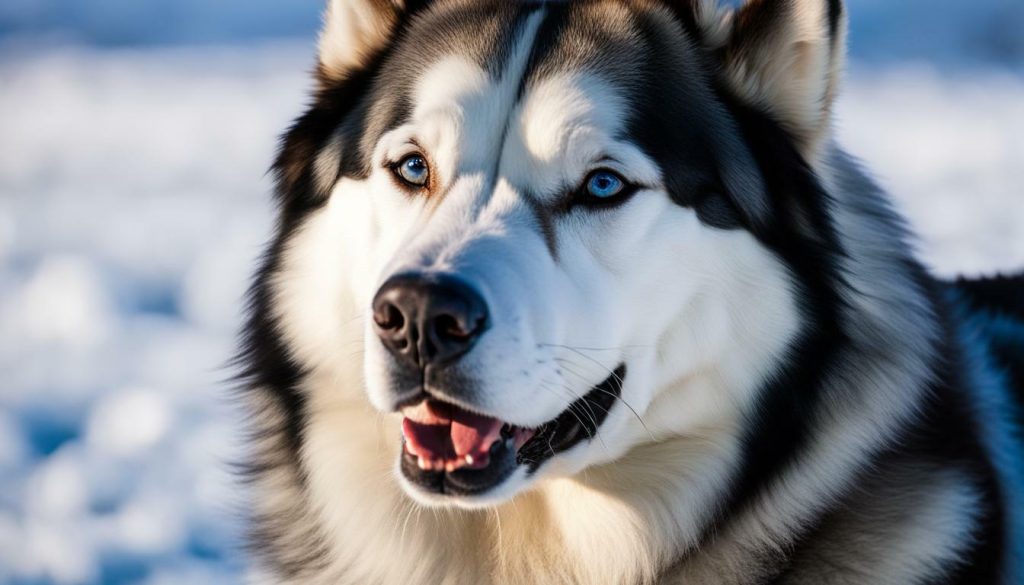
| Dental Health Tips for Malamutes |
|---|
| 1. Schedule regular dental check-ups with your veterinarian. |
| 2. Brush your dog’s teeth regularly using dog-friendly toothpaste. |
| 3. Offer dental chews or toys to help clean your Malamute’s teeth. |
| 4. Avoid feeding your Malamute hard or chewy treats that can damage their teeth. |
| 5. Monitor your dog’s eating habits and look out for signs of dental pain or discomfort. |
Recognizing Health Issues
If your Malamute’s lack of appetite persists, it may be worth considering if an underlying health issue is the cause. Dogs, like humans, can experience a range of health problems that can affect their appetite. Here are some common health issues that may be contributing to your Malamute’s refusal to eat:
| Health Issue | Description |
|---|---|
| Gastrointestinal Problems | Conditions such as stomach ulcers, gastritis, or intestinal blockages can cause pain and discomfort, leading to a loss of appetite. |
| Dental Issues | Toothaches, gum infections, or other dental problems can make it painful for your Malamute to chew their food, resulting in a decreased appetite. |
| Infections | Viral or bacterial infections can cause a temporary loss of appetite in dogs. Monitor your Malamute for other symptoms such as vomiting, diarrhea, or lethargy. |
| Medication Side Effects | Certain medications can have a negative impact on a dog’s appetite. Consult with your veterinarian if you suspect this may be the cause. |
| Hormonal Imbalances | Conditions such as hypothyroidism or Cushing’s disease can affect a dog’s metabolism and appetite. Blood tests can help diagnose these issues. |
If you notice any concerning symptoms in addition to your Malamute’s lack of appetite, such as weight loss, lethargy, or changes in behavior, it is essential to consult with your veterinarian. They will be able to conduct a thorough examination and recommend appropriate tests or treatment options.
If your Malamute’s health is not a concern, continue to explore other potential factors affecting their appetite, as outlined in earlier sections of this article. Remember to provide a balanced diet and offer a variety of food options to keep your Malamute interested in eating.
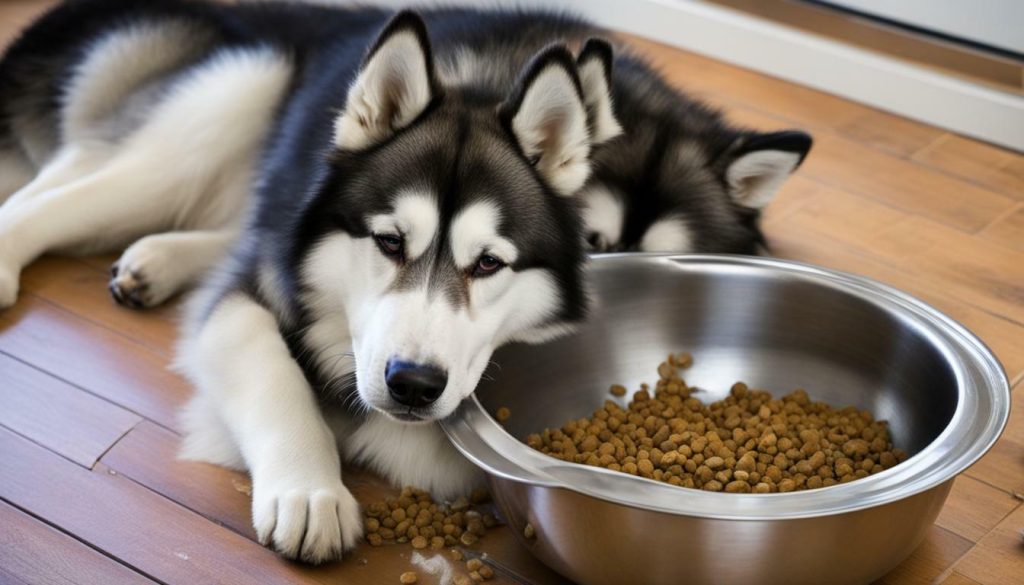
“A healthy dog is a happy dog, and appetite plays a crucial role in their overall well-being. If your Malamute’s lack of appetite persists, it’s time to reach out for professional advice.”
Addressing Anxiety and Stress
Just like humans, Malamutes can experience anxiety and stress, which may result in a decreased appetite. If your Malamute is refusing to eat and you suspect it may be due to anxiety or stress, there are several steps you can take to help alleviate their discomfort.
First, creating a calm and comforting environment for your Malamute can make a big difference. Ensure they have a quiet space where they can retreat to when they feel overwhelmed. Using soft, soothing music or a calming diffuser can also help create a relaxing atmosphere.
Physical exercise can be an effective way to reduce anxiety and stimulate appetite. Regular walks, play sessions, or even mental stimulation games can help release pent-up energy and promote a sense of well-being. Incorporating exercise into your Malamute’s daily routine can help them feel more relaxed and ultimately encourage them to eat.
| Anxiety Relief Strategies | Benefits |
|---|---|
| Creating a calm environment | Reduces stress levels and promotes relaxation |
| Physical exercise | Reduces anxiety, releases endorphins, and stimulates appetite |
| Using puzzle toys | Provides mental stimulation and distracts from anxiety |
| Seeking professional help | Allows for tailored treatment plans and medication if necessary |
If your Malamute’s anxiety or stress levels persist or worsen, it may be beneficial to seek professional help. Consulting with a veterinarian or an animal behaviorist can provide valuable insight and guidance. They can help identify the underlying causes of your Malamute’s anxiety and recommend appropriate treatment options, including behavior modification techniques or, in some cases, medication.
Remember, addressing anxiety and stress requires patience and understanding. By providing your Malamute with a supportive environment, engaging them in regular exercise, and seeking professional guidance if needed, you can help them feel more at ease and regain their appetite.
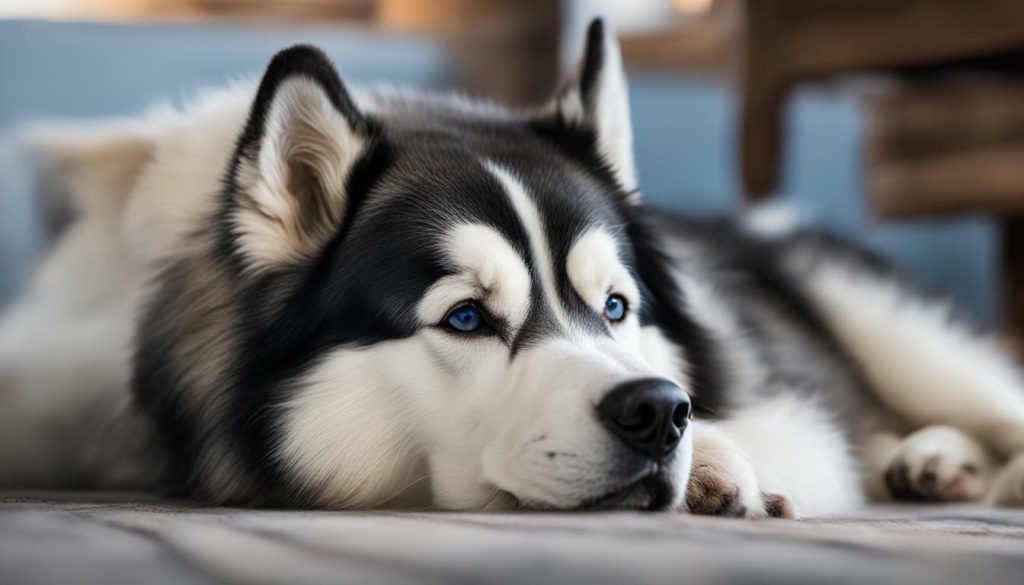
If your Malamute’s refusal to eat is accompanied by other concerning symptoms or if they have recently received vaccinations, it is important to consult a veterinarian. While it is common for dogs to occasionally skip a meal or have a decrease in appetite, persistent refusal to eat can be a sign of an underlying health issue.
Common symptoms to look out for:
| Symptom | Possible Health Issue |
|---|---|
| Vomiting | Gastrointestinal problems, such as an obstruction or infection |
| Diarrhea | Digestive issues or infection |
| Lethargy | Pain, illness, or an underlying medical condition |
| Weight loss | Metabolic disorders, organ dysfunction, or parasites |
| Excessive thirst or urination | Diabetes, kidney disease, or hormonal imbalances |
If your Malamute exhibits any of these symptoms in addition to their refusal to eat, it is vital to seek veterinary attention within 8-12 hours. Timely intervention can help identify and address any potential health issues, ensuring the well-being of your beloved pet.
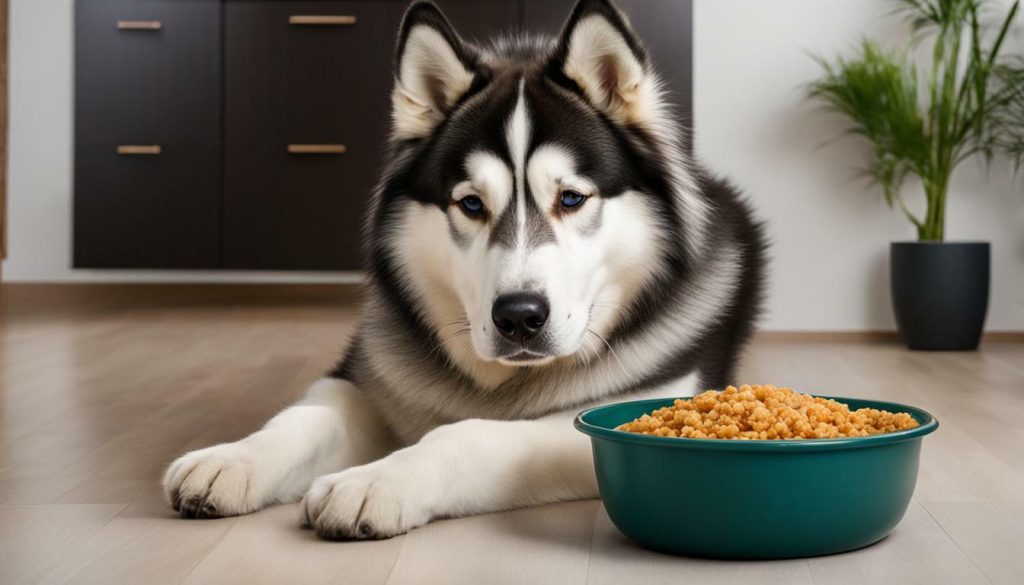
Medications and Their Impact on Appetite
It is not uncommon for certain medications to cause a temporary loss of appetite in Malamutes. When your furry companion is on medication, it is important to be aware of this potential side effect. Some medications may affect the taste buds or cause nausea, leading to a decreased interest in food.
If you notice that your Malamute’s appetite has decreased after starting a new medication, it is important to consult with your veterinarian. They can help determine if the medication is indeed the cause and provide guidance on how to manage the situation.
One strategy is to administer the medication with a small amount of food, as this can help mask any unpleasant taste and encourage your Malamute to eat. However, always consult with your veterinarian first to ensure that administering the medication with food is appropriate for the specific medication your Malamute is taking.
| Medication Name | Possible Side Effect |
|---|---|
| Medication A | Loss of appetite |
| Medication B | Nausea |
| Medication C | Altered taste |
“My Malamute started taking Medication A, and I noticed that he has been eating less. It’s important to monitor his appetite and consult with the veterinarian if the situation persists.”
Remember, it is essential to follow the prescribed dosage and administration instructions provided by your veterinarian. If you have any concerns about your Malamute’s appetite while on medication, always reach out to your veterinarian for guidance and support.
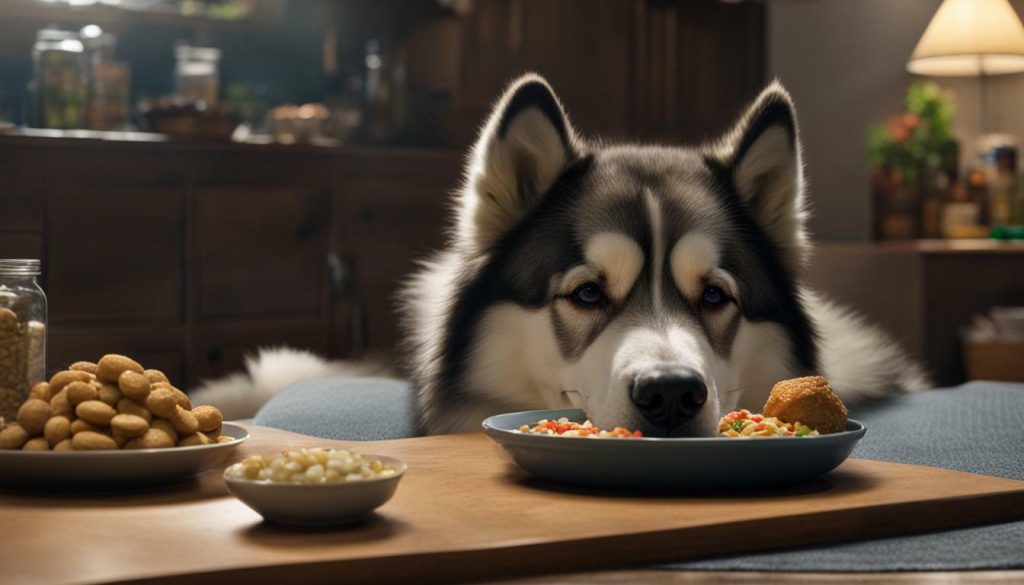
Malamutes, like any other dogs, may have preferences for specific mealtimes or become disinterested if their regular food has changed or gone stale. It’s important to understand their individual preferences and adapt to their needs to ensure they maintain a healthy appetite.
One way to cater to your Malamute’s mealtime preferences is to establish a consistent feeding schedule. This helps them develop a routine and anticipate when their meals will be served. Observing when your Malamute shows the most enthusiasm for their food can give you insight into their preferred mealtimes.
If your dog’s regular food has changed or if they seem disinterested, it could be due to the flavor or texture not appealing to them. In such cases, it may be helpful to introduce new flavors or rotate between different brands or varieties of dog food. However, it’s important to introduce any changes gradually to avoid digestive upset or aversion.
| Tip: | Freeze-dried meat toppers |
|---|---|
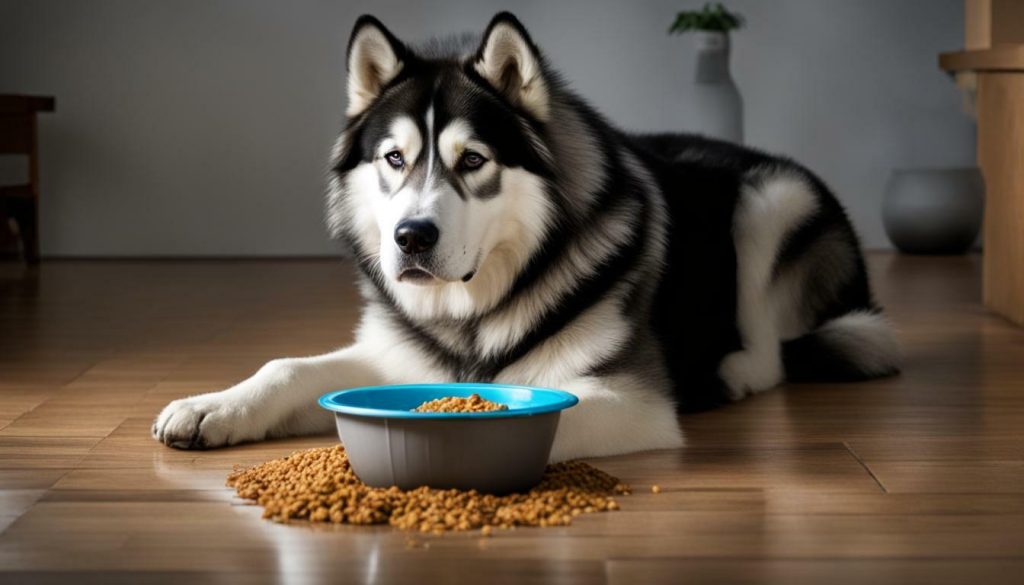 |
Another option to address mealtime preferences is to enhance the flavor and nutrition of your Malamute’s regular food with food toppers. Freeze-dried meat toppers are a popular choice as they are convenient, safe, and provide an extra burst of flavor. These toppers not only entice picky eaters but also offer additional nutrients that can help support your Malamute’s overall health and wellbeing.
Summarizing:
Understanding your Malamute’s mealtime preferences and adapting to their needs can help maintain a healthy appetite. Establishing a consistent feeding schedule and observing when they show the most enthusiasm for their food can provide valuable insights. Introducing new flavors or rotating between different dog food brands can also help prevent boredom and disinterest. Consider adding freeze-dried meat toppers to enhance the flavor and nutrition of your Malamute’s meals, ensuring they receive the necessary nutrients while satisfying their picky eating tendencies.
| Section 11 Summary |
|---|
| Understanding mealtime preferences and changes |
| Establishing a consistent feeding schedule |
| Introducing new flavors or rotating between different brands |
| Using freeze-dried meat toppers to enhance flavor and nutrition |
Summary and Final Advice
If your Malamute is refusing to eat, it is crucial to consider various factors and try different strategies to address their appetite. Some Malamutes can be picky eaters and may become bored with their regular food. Adding a food topper, such as freeze-dried meat, can enhance the flavor and provide additional nutrients.
There can be several reasons why a Malamute stops eating, including lack of exercise, lack of nutrients in the food, anxiety, toothache, or other health issues. It is important to try different approaches, such as changing the food, offering treats, and ensuring your Malamute gets enough exercise. Additionally, seeking veterinary attention may be necessary if there are concerning symptoms or significant changes in eating habits.
If your Malamute is showing symptoms of illness like vomiting or diarrhea, it is crucial to contact a veterinarian within 8-12 hours. Certain medications can also affect a Malamute’s appetite, so it is important to monitor their eating habits while on medication. Life changes or owner absence can cause anxiety, which may impact a Malamute’s hunger. It is also worth considering the time of day your Malamute prefers to eat and ensuring their regular food is fresh and appealing.
In conclusion, if your Malamute is not eating, it is important to consider various factors and try different strategies to address their appetite. Remember to consult with a veterinarian if needed and provide a balanced and appealing diet to keep your Malamute healthy and happy.
FAQ
Q: Why is my Malamute not eating?
A: There can be various reasons why a Malamute stops eating, including picky eating, lack of exercise, lack of nutrients in the food, anxiety, boredom with the same food, toothache, stomachache, recent vaccination, or other health issues.
Q: What can I do to encourage my Malamute to eat?
A: You can try different strategies such as changing the food, offering treats, ensuring they are active enough, and seeking veterinary attention if necessary.
Q: Should I be concerned if my Malamute is not eating?
A: If your Malamute is not eating and also experiencing symptoms such as vomiting, diarrhea, or other signs of illness, it is important to contact a veterinarian within 8-12 hours. Otherwise, it may be helpful to try different approaches to stimulate their appetite.
Q: How can I enhance my Malamute’s meals?
A: Adding food toppers, such as freeze-dried meat, can enhance the flavor and nutrition of your Malamute’s regular food. Make sure the toppers are healthy and provide the necessary nutrients.
Q: What factors can affect a Malamute’s appetite?
A: Factors such as lack of exercise, boredom with the same food, dental issues, anxiety, stress, and recent vaccinations can all impact a Malamute’s appetite.
Q: When should I seek veterinary attention for my Malamute not eating?
A: If your Malamute is not eating and there are concerning symptoms or recent vaccinations, it is recommended to contact a veterinarian for further evaluation and guidance.
Q: Can medications affect a Malamute’s appetite?
A: Yes, certain medications can affect a Malamute’s appetite. If you suspect that medication may be the cause of their decreased appetite, consult with your veterinarian for potential solutions.
Q: How do mealtime preferences and changes impact a Malamute’s eating habits?
A: Malamutes may have specific preferences for the time of day they prefer to eat and may refuse food if their regular food has changed or gone stale. Being consistent with mealtime routines can help maintain their eating habits.
Q: What is the final advice for dealing with a Malamute not eating?
A: It is important to consider various factors and try different strategies to encourage your Malamute’s appetite. Contacting a veterinarian may be necessary if there are concerning symptoms or a significant change in eating habits.
